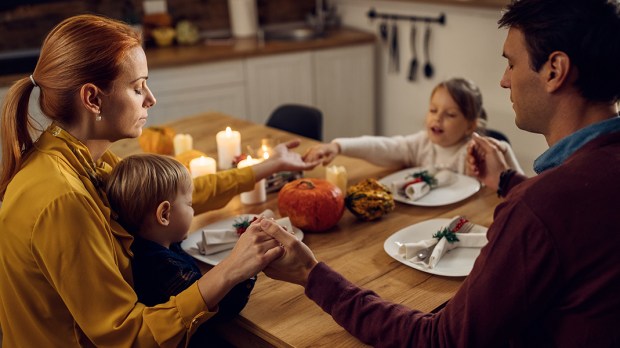In my mind, dinnertime is a wonderful and peaceful experience that everyone looks forward to throughout the day. (It is also important for our family’s well-being.) The main duties of the day are done, and delicious food restores everyone’s moods and prepares them for a restful evening. The conversation at dinner is uplifting and enjoyable, bringing everyone together. That, at least, is my dream.
But I learned early on that a happy dinnertime doesn’t just materialize magically out of thin air. Grumpiness can turn everything sour, a silly and frustrating conversation can derail the meal, and if there are no habits established, antsiness and “Can I leave the table now?” rule the day. Nowadays, my dinnertime dream is realized more evenings than not, but it has taken some intentional training and practice to get dinnertime to become a memorable and positive experience. Here are some things we have tried that have helped make dinnertime more meaningful.
Put away screens, and set a time for how long dinner will last.
Making screens off limits during dinner will limit distractions and allow (or force) everyone to be just a little more present. We found we needed to set a timer for a while to keep everyone at the table for a minimum amount of time. We started with just 10 or 15 minutes and built up from there, gradually training our little kids to sit still for longer periods of time with us.
Give everyone a task for getting ready for dinner and cleaning up afterwards.
Add some front-end and back-end time to your meal and take the burden off cleaning and preparation off of one person by sharing responsibilities. Someone can set the table, do some dishes, and make a salad before dinner, while clearing, more dishes, and sweeping can be done after dinner. Also, helping clean all together might be a more laid-back setting for conversation than during dinner, which means you might get more people to open up and join in a discussion than you would otherwise.
Start with a prayer.
Once everyone is gathered, but before you start eating, pray together. This is a great time and place for smaller children to learn prayers, and for older children to reinforce those prayers in their memory. If everyone is trying to learn the St. Michael prayer, or your second grader is trying to memorize the Act of Contrition for her first Reconciliation, this is a place you could all pray it together before saying a prayer of thanks for the food.
Guide intentional conversations.
Try having everyone present share something about their day. Or have each member of the family take turns choosing a topic that will be discussed at dinner. That way you can cover everyone’s pet discussion topics over the course of several days or a couple weeks. One thing that my mom and dad did with us growing up was that they encouraged everyone to think of a compliment for the person to their right. They employed this especially on days where a pervasive grumpiness and bickering angst hung in the air. And a final note on guiding conversations–at the end of the day, don’t be discouraged if it takes a while to get everyone on board and accustomed to participating in dinner conversation. Slow and steady baby steps will keep dinnertime moving forward, or at least keep it from regressing into complete chaos.
End dinner with everyone sharing something he or she is grateful for from the day
No matter what happened with your best efforts at meaningful conversation, finish the meal on a positive note by sharing the beautiful moments of your day.


